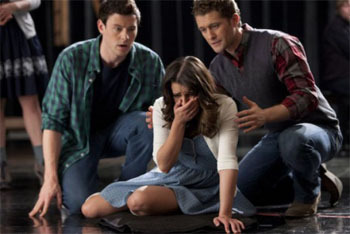
by Emma Gray
Glee’s Rachel Berry Confronts Her “Jewish Nose”
 Last week, Glee aired a much-anticipated 90-minute episode, entitled “Born This Way,” after Lady Gaga’s inclusive anthem. During the episode, each character deals with the things about themselves that they are most ashamed of, ultimately embracing these characteristics. For Rachel Berry (played by Lea Michele), one of the most markedly Jewish characters on the show, her challenge is accepting her not-so-button nose.
Last week, Glee aired a much-anticipated 90-minute episode, entitled “Born This Way,” after Lady Gaga’s inclusive anthem. During the episode, each character deals with the things about themselves that they are most ashamed of, ultimately embracing these characteristics. For Rachel Berry (played by Lea Michele), one of the most markedly Jewish characters on the show, her challenge is accepting her not-so-button nose.
The myth of the Jewish nose is one of the most widely espoused Jewish stereotypes. Its origins can be traced to the flawed “science” of 19th century Eugenics movements. Eugenics attempted to define ethnicity through physical characteristics. In his book Making the Body Beautiful, Sander L. Gilman explains that these traits were generally compared to and vilified in relation to a white, European “ideal.”
The German children’s storybook, Der Giftpilz, published in 1938, provides a perfect example of the explicit discussion of the Jewish nose. In one of the stories, Little Karl, a 7th grade schoolboy, describes to his classmates how to recognize a Jew. “One can most easily tell a Jew by his nose. The Jewish nose is bent at its point. It looks like the number six. We call it the Jewish six.”
Although we have come a long way since 20th century ideas of racial purity, the myth of the giant Jew nose still runs rampant, providing perfect fodder for Glee’s writer, Brad Falchuk. Falchuk himself happens to be Jewish, as well as the son of the current president of national Jewish women’s organization, Hadassah.
After Rachel’s nose is broken by fellow glee clubber Finn’s erratic dance moves, she visits a doctor who suggests that she consider rhinoplasty. He even goes so far as to describe the procedure as “a rite of passage for Jewish girls.” The doctor – who is portrayed as a Jewish character, signaling the policing of Jewish women’s looks within the Jewish community itself – gets to Rachel. His words cut even deeper as she compares herself to blonde, Christian, dainty-nosed Quinn Fabray.
The girls’ duet “I Feel Pretty/Unpretty,” sung as Rachel is in the plastic surgeon’s chair, is particularly moving. It is made even more interesting by the fact that the teen queen is portrayed by Dianna Agron, herself a Jewish actress. While Lea Michele’s more “ethnic” looks allow her to be easily cast as a Jewish character, Agron’s Jewishness remains invisible.
Although many of the glee club members urge Rachel to embrace her face as is and forgo plastic surgery, Rachel remains determined to go though with the procedure. She even has composites of herself made up, digitally replacing her nose with Quinn’s. Badass Jew, Noah “Puck” Puckerman, is one of the characters most adamantly against Rachel’s nose dreams.
“Every year girls show up to my temple after their 16th birthday looking suddenly slightly different. And you know what? Even though it’s easier to make out with them without getting constantly stabbed in the eye, they’re not as hot,” he says.
In a last-ditch effort to preserve the ethnic marker that is Rachel’s nose, Kurt and Puck team up to stage a “Barbra-vention.” Appealing to Rachel’s adoration for Ms. Streisand, it is Barbra’s iconic image that finally gets through to Ms. Berry. An underlying theme of the storyline is the idea that everyone needs a role model that they can see themselves in. A whitewashed version of Rachel Berry would be no Rachel Berry at all.
The episode’s other major story arcs were equally as compelling. The audience watched Santana and Karofsky struggle with their closeted gay identities, Ms. Pillsbury come to terms with her OCD diagnosis and Quinn admit that she too had been wounded in the battle for physical perfection. Although the episode veers at times into cheesy, after-school special territory, I appreciated its sweet and earnest message. No matter how obvious the lesson might seem, we all need to hear it over and over again, especially living in a society that so often, even if subtly, tells us otherwise.
The best way to end this post is with the words of Lady Gaga herself: “Rejoice and love yourself today. ‘Cause baby you were born this way.”